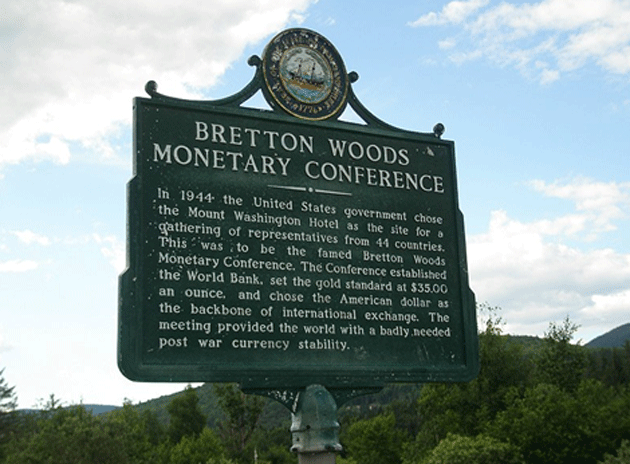
By Patrick Watson*
Last month, world leaders observed the 75th anniversary of D-Day, when Allied troops stormed the beaches of Normandy, France. It was a critical day in world history.
However, other things happened that year.
As that massive invasion took place, a smaller group quietly planned how to reshape the world economy.
The Second World War was, in part, a result of failure to establish a stable currency system after the first one. That led to tariffs and other trade barriers in the 1930s. Economists and bankers wanted to keep it from happening again, and spent the war years discussing solutions.
Now we’re in a similar predicament. The postwar economic system has worked pretty well in some ways, but it left many people behind. They are unhappy. Populist leaders are responding with the same kind of protectionism that didn’t work back then.
It probably won’t end well.

Photo: Wikimedia
Imbalances
“When goods don’t cross borders, armies will,” is a quote often attributed to 19th-century French economist Frederic Bastiat. It’s unclear if he actually said it, but history shows it is often right.
Nations that trade with each other rarely resort to war because a) war disrupts business and b) trade creates relationships and open communication.
Conversely, lack of trade breeds suspicion, which sometimes leads to conflict. So free trade is a good way to promote international peace.
But that only goes so far. Importing countries get useful products while exporters receive money, the value of which may change for reasons beyond the exporter’s control. The resulting losses breed resentment and distrust.
Trade would be easier and war less common if the entire world shared a common medium of exchange. But that can’t happen because national governments want to control their own currencies. There are good reasons for that, too, but the resulting imbalances, combined with other conditions, led to World War II.
But even as that war raged on, a movement emerged to keep it from happening again. It culminated 75 years ago this month at a New Hampshire resort hotel.

Photo: Wikimedia
Fixed rates
On July 1, 1944, at the Mount Washington Hotel in Bretton Woods, New Hampshire, 730 delegates from the 44 Allied nations gathered to redesign the international financial order.
That’s no exaggeration, nor was it a shadowy conspiracy. That’s really what happened. Formally called the “United Nations Monetary and Financial Conference,” it created the International Monetary Fund and the World Bank.
More important, Bretton Woods created a system of exchange rates pegged to gold, and a pledge by member nations to convert their currencies as needed to facilitate international trade.
I know… boring stuff. But it was important. British economist John Maynard Keynes, his US counterpart Harry Dexter White, and others designed a system they hoped would allow robust trade without the occasional currency crises they had seen several times.
Was theirs the only solution? Probably not. Nor was it the best one, or the fairest one. But the goal was improvement, not perfection. The following decades suggest they accomplished it.

Photo: Wikimedia
Hasty change
The Bretton Woods agreement worked pretty well for about 20 years. Many people now look back on the 1950s as a kind of golden age. If only we could go back, they say.
But weirdly, those same folks often don’t want the kind of international cooperation that made those halcyon days so prosperous. They want to retreat within their own borders and keep their economies independent.
They can do that, but it has a cost. Free trade in goods and ideas leads to maximum prosperity for everyone. That is why the golden age was so golden (for some, at least).
Bretton Woods began falling apart in the 1960s. Then in 1971, Richard Nixon suspended the dollar’s gold convertibility and the fixed-rate system fell apart. Now exchange rates float with markets.
Is that an improvement? Maybe. But the 1970s were also when the economy started shifting toward the winner-take-all system we now find problematic. Maybe there’s a connection.
Obviously, much has changed since 1944. A system designed for that world probably isn’t what today’s world needs.
Among other things, technology is bringing production closer to consumers. The globalized economy in which low-paid workers in the developing world mass produce goods for shipment to wealthy countries is slowly going away.
Or maybe not so slowly. Rather than let that process unfold naturally, populist leaders like Donald Trump are using tariffs and other trade barriers to hasten the change.
And rather than hash out a solution like Bretton Woods that at least tries to balance everyone’s interests, they want to dictate terms and force others to accept them.
That is not how we got the strong economy they idealize. Historically, it’s more often delivered the opposite.
Maybe this time will be different… but probably not.
*Patrick Watson is senior economic analyst at Mauldin Economics. This article is from a regular Mauldin Economics series called Connecting the Dots. It first appeared here and is used by interest.co.nz with permission.
8 Comments
Could China be the initiator in the foreseeable future for the next Bretton Woods style conference to change the world monetary/fiscal order ?
Could the dominance of the US $ be ended by a Yuan pegged crypto to be developed by China ?
Would the US preempt China by introducing 'Stablecoin' pegged to the US $ ?
With the underhanded tactics and behind closed doors manipulation in China's financial and corp worlds, I cant see anyone trusting the Yuan, but I can see an international currency at some stage in the future, maybe even a state crated static crypto that is auto taxed and super regulated. Big brother style.
This column does not seem to acknowledge the Marshall plan? After WW1 Europe was severely indebted to the USA. In the thirties they began to solicit that these be forgiven and eventually started defaulting. Hoover, I think, reacted swiftly. Countries that defaulted were blacklisted by the USA, commerce and financials. But the period of WW2 looming, and Roosevelt’s relative strategies mostly kept the lid on that. And so to post WW2. The USA under the Marshall plan poured billions into Western Europe. This was seen to be a bulwark against the approaching Iron Curtain and it kept USA production underway at near to the foregoing war footing. So perhaps the USA remembers this as easily as those European nations may have forgotten. Don’t need to delve to far into the balance sheet to determine the USA is, in recently made history, a giant creditor to Europe.
I am pretty sure when the world embarked on this that there was little thought of mighty corporations seeking out countries where they could pay the least and pay the least regard to working conditions then sell into countries where the largest amount could be obtained for whatever it was they turned out. Actually, there was probably little regard for third world countries other than to refer to them as such.
I am fairly certain that the idea was that country A that produced this could sell to country B who produced that which they in turn sold to country A or C and so on, and so it should be easier to do.
I doubt there was much consideration given to everything ending up in the hands on very few, often based in countries far from where the production was, and then how corporations almost have more say in countries as the citizens do and fail to pay taxes within the countries they operate. I still believe that it is the corporatization of the world that is the problem
Thank you for a great and informed article -- for those of us who use the site who are not economists or similar, i am sure this is enlightening -- i for one thought it provides some very interesting context -- and given the conflicts between increased levels of protectionism on some sides -- and a desire to remove all trade barriers on another -- a useful reminder of how and why our present day system emerged
there are those of us who believe Bretton Woods only lasted a few years, to be replaced by the Eurodollar.
An advanced IOU system between banks.
Firstly, how can you write an article about Bretton Woods and John-Maynard-Keynes without mentioning the proposed 'The Bancor' - it does the reader a disservice.
Secondly, you failed to point out [implications] that since coming off the Gold Standard, money [US Petrol Dollar] became backed by nothing and has since lost AT LEAST 95% of its value.
Money is many things .. a measure stick is one of them. Gold was a good measuring stick [fixed supply/issuance]. Bitcoin is a good measuring stick [fixed supply/issuance]. Dollars are not a good measuring stick. Imagine measuring your window-frames for new blinds, but when you get to the store the length of a centimeter has drastically changed.
Crypto-Currencies, namely Bitcoin has arrived. So yeah, why would you hold State currency? And that's what we're slowly starting to see. People spend their bad currency, Dollars and save their good currency, Bitcoin. Proponents of fiat currencies are like the old, Japanese, WW2 soldier; still hunkered down, ready to take on the allies, even though the war end 10 years ago.
Z B,
Why would the Bancor be mentioned? How does that do the reader a disservice? It's no more than an interesting but unimportant detail,so unimportant that it is simply not mentioned in either Felix Martin's Money,an Unauthorised Biography or Naill Ferguson's The Ascent of Money.
How many hold Bitcoin? What actual evidence do you have that people are gradually abandoning their national-fiat-currencies in favour of Bitcoin or any other crypto-currency?

We welcome your comments below. If you are not already registered, please register to comment
Remember we welcome robust, respectful and insightful debate. We don't welcome abusive or defamatory comments and will de-register those repeatedly making such comments. Our current comment policy is here.